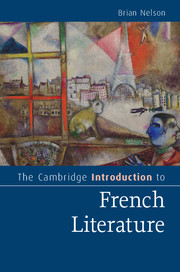Book contents
- Frontmatter
- Dedication
- Contents
- Preface
- Acknowledgements
- Chronology
- 1 Villon: a dying man
- 2 Rabelais: the uses of laughter
- 3 Montaigne: self-portrait
- 4 Corneille: heroes and kings
- 5 Racine: in the labyrinth
- 6 Molière: new forms of comedy
- 7 La Fontaine: the power of fables/fables of power
- 8 Madame de Lafayette: the birth of the modern novel
- 9 Voltaire: the case for tolerance
- 10 Rousseau: man of feeling
- 11 Diderot: the enlightened sceptic
- 12 Laclos: dangerous liaisons
- 13 Stendhal: the pursuit of happiness
- 14 Balzac: ‘All is true’
- 15 Hugo: the divine stenographer
- 16 Baudelaire: the streets of Paris
- 17 Flaubert: the narrator vanishes
- 18 Zola: the poetry of the real
- 19 Huysmans: against nature
- 20 Mallarmé: the magic of words
- 21 Rimbaud: somebody else
- 22 Proust: the self, time and art
- 23 Jarry: the art of provocation
- 24 Apollinaire: impresario of the new
- 25 Breton … Company: Surrealism
- 26 Céline: night journey
- 27 Sartre: writing in the world
- 28 Camus: a moral voice
- 29 Beckett: filling the silence
- 30 French literature into the twenty-first century
- Notes
- Further reading
- Index of authors and titles
- Index of genres, movements and concepts
- Cambridge Introductions to …
- References
10 - Rousseau: man of feeling
Published online by Cambridge University Press: 05 July 2015
- Frontmatter
- Dedication
- Contents
- Preface
- Acknowledgements
- Chronology
- 1 Villon: a dying man
- 2 Rabelais: the uses of laughter
- 3 Montaigne: self-portrait
- 4 Corneille: heroes and kings
- 5 Racine: in the labyrinth
- 6 Molière: new forms of comedy
- 7 La Fontaine: the power of fables/fables of power
- 8 Madame de Lafayette: the birth of the modern novel
- 9 Voltaire: the case for tolerance
- 10 Rousseau: man of feeling
- 11 Diderot: the enlightened sceptic
- 12 Laclos: dangerous liaisons
- 13 Stendhal: the pursuit of happiness
- 14 Balzac: ‘All is true’
- 15 Hugo: the divine stenographer
- 16 Baudelaire: the streets of Paris
- 17 Flaubert: the narrator vanishes
- 18 Zola: the poetry of the real
- 19 Huysmans: against nature
- 20 Mallarmé: the magic of words
- 21 Rimbaud: somebody else
- 22 Proust: the self, time and art
- 23 Jarry: the art of provocation
- 24 Apollinaire: impresario of the new
- 25 Breton … Company: Surrealism
- 26 Céline: night journey
- 27 Sartre: writing in the world
- 28 Camus: a moral voice
- 29 Beckett: filling the silence
- 30 French literature into the twenty-first century
- Notes
- Further reading
- Index of authors and titles
- Index of genres, movements and concepts
- Cambridge Introductions to …
- References
Summary
How blind we are in the midst of so much enlightenment.
– Rousseau, Lettre à d'Alembert‘I will … venture to say,’ wrote Jean-Jacques Rousseau (1712–78) at the beginning of his Confessions, ‘that I am like no one in the whole world. I may be no better, but at least I am different.’ Rousseau was indeed different, in sensibility and temperament, from the other leading figures of the French Enlightenment. Whereas they believed that society could be improved by reform, Rousseau believed that it should be entirely rebuilt; and whereas the former believed that truth could be discovered, and progress achieved, by means of civilization and rational thought, Rousseau believed that truth and a better way of life might be attained by looking within the heart of the simple uncorrupt human being, the ‘noble savage’, or the child. A powerful and highly original thinker, and a writer of great eloquence, Rousseau's influence on his own and later generations was profound. His Social Contract became one of the most celebrated political treatises ever written; his Emile; or, On Education (1762) was a radical work of educational theory; his staggeringly successful Julie, or the New Heloise (1761) established the novel of sensibility; and his Confessions inaugurated modern autobiography as a literary genre. Worshipped and reviled during his own lifetime, he later became a hero of the French Revolution and an icon of Romanticism.
Critique of society
Son of a watchmaker, Rousseau was born on 28 June 1712 in the small Calvinist city-state of Geneva. He ran away from home when he was sixteen, beginning a lifetime of wandering. In the autumn of 1741, he arrived in Paris, where he was drawn into the circle of freethinkers or philosophes around the Sorbonne. He became a close friend of Diderot. In the late 1740s he began writing plays, and then preparing articles on music and political economy commissioned by d'Alembert and Diderot for the publishing venture that would become the great Encyclopédie (1751–72).
- Type
- Chapter
- Information
- The Cambridge Introduction to French Literature , pp. 67 - 73Publisher: Cambridge University PressPrint publication year: 2015

